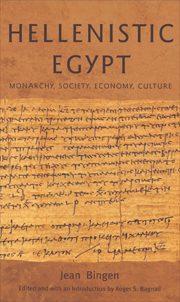Book contents
- Frontmatter
- Contents
- Original Sources of Chapters
- List of illustrations
- Glossary
- Maps
- Foreword
- Introduction: Jean Bingen and the currents of Ptolemaic history
- Part I The Monarchy
- Part II The Greeks
- Part III The Royal Economy
- Part IV Greeks and Egyptians
- Conclusion
- Bibliography
- General index
- Index of passages discussed
- HELLENISTIC CULTURE AND SOCIETY
Introduction: Jean Bingen and the currents of Ptolemaic history
- Frontmatter
- Contents
- Original Sources of Chapters
- List of illustrations
- Glossary
- Maps
- Foreword
- Introduction: Jean Bingen and the currents of Ptolemaic history
- Part I The Monarchy
- Part II The Greeks
- Part III The Royal Economy
- Part IV Greeks and Egyptians
- Conclusion
- Bibliography
- General index
- Index of passages discussed
- HELLENISTIC CULTURE AND SOCIETY
Summary
The history of Ptolemaic Egypt is not among those parts of ancient history with a long past. If the identification of the Hellenistic Greek world as a subject goes back to the first half of the nineteenth century, it was not until after the publication of papyri from Hellenistic Egypt began to make an impression on scholars that this part of the Hellenistic world took on a distinct identity and became an object of separate investigation. These studies, as one might expect, were strongly marked by the currents of their times. Among other parts of the outlook of the period stretching down to World War II we can hardly fail to notice the assumption that the unitary nation-state, with a single language and culture and with a deliberate policy of fostering cultural unity, was a natural institution.
The European nations that were the homes of those who studied Ptolemaic Egypt had other common characteristics as well. They were colonising powers, with as yet little doubt that they had a legitimate mission in controlling and settling other parts of the globe; they were in the midst of developing a far more ambitious state apparatus than history had known before, in the service of a far-reaching sense of the proper role of the state; and they had entrenched national churches, the relationships of which with the government were of some complexity and in some cases a matter of competition for power in certain domains of life.
- Type
- Chapter
- Information
- Hellenistic EgyptMonarchy, Society, Economy, Culture, pp. 1 - 12Publisher: Edinburgh University PressPrint publication year: 2007



